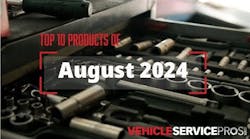Content brought to you by Motor Age. To subscribe, click here.
What You Will Learn:
• A dirty cabin filter can be risky to your health
• Many cabin filters utilize charcoal in their construction
• Cabin filters reduce the strain on the HVAC system
In recent years, as part of a greater focus on health and safety, more people have been giving thought to the quality of the air they are breathing. Pollutants, pollen, and odors can all have a major impact on our health, as well as the comfort and enjoyment of our personal spaces. Many individuals and businesses have chosen to purchase air filters or filtration systems to help reduce the number of particulates in their spaces and to provide fresher and cleaner air. Shop owners can help do the same for drivers in their vehicles by replacing cabin air filters regularly.
As people spend more time behind the wheel or as a passenger in vehicles, a clean and properly operating cabin air filter is extremely important. By identifying when a cabin air filter needs replacing, shop owners have an excellent opportunity to help improve the comfort and health of their customers, capitalize on a preventive maintenance step, and improve the overall performance of a vehicle’s HVAC system.
Pungent pollutants
Just like oil and fuel filters help keep contaminants out of the liquids that are crucial to healthy engine performance, cabin air filters keep particles out of the air inside the vehicle cabin. Cabin air filters remove pollen, pollutants, dust, soot, and exhaust gases from the air entering the vehicle. The filters also help reduce unpleasant odors from bacteria and fungi. Some cabin air filters include active carbon formulations that can capture particles as small as 0.01 to 2 micrometers.
Showing a vehicle owner the side-by-side difference between a brand-new cabin air filter and the dirty one removed from their vehicle can clearly demonstrate that the air inside their vehicle is not as clean as they may want it to be.
An ounce of prevention
Most shop owners know that the easiest way to prevent problems in the future is by being proactive. If a vehicle is about to embark on a long road trip or is entering a heavy driving season, preventive maintenance is the best way to keep it running smoothly and out of the shop. In addition to an oil change, wiper replacement, and tire rotation, shop owners can educate drivers on the advantages of replacing their cabin air filter.
Not only does a new filter help keep the air inside the vehicle free of pollutants, but it also helps reduce the overall strain on the HVAC system. As the cabin air filter becomes clogged, the vehicle’s HVAC system is forced to work harder, reducing the efficiency of the heating and cooling systems that keep the vehicle comfortable. When the HVAC system is stressed, it also affects the driver’s ability to see clearly out of the vehicle as the HVAC system works harder to clear window condensation. All of this extra effort can lead to potential problems for the blower motor, as it works harder to circulate the air.
Explaining to a customer how the efficacy of their heating and air conditioning system can be negatively affected by an old cabin air filter is a simple way to increase service opportunities.
The season is here
With the spring and summer driving seasons approaching, there will be an increase in the amount of pollen in the air, exhaust gases on the roadways, and the need for efficient air conditioning to keep vehicles comfortable for drivers. Many vehicle manufacturers recommend replacing cabin air filters every 10,000 - 30,000 miles, but others see the replacement as a seasonal need. As drivers take longer trips and spend more time inside of their vehicles, they can become more aware of the quality of the air and the performance of their HVAC systems.
Shop owners should also be aware that the region in which they live can have an impact on how frequently a cabin air filter needs to be replaced. Vehicles that spend more time driving in urban areas are subjected to more exhaust gases and pollutants, while vehicles that drive in rural areas are more likely to be affected by dust. Both can lead to the need to replace the cabin air filter ahead of manufacturer intervals.
Whether the air inside the vehicle is becoming stale, or the vehicle owner complains of a weak HVAC system, shop owners should be aware that a clean cabin air filter is a key component of keeping both their customer and the vehicle healthy and running smoothly.

